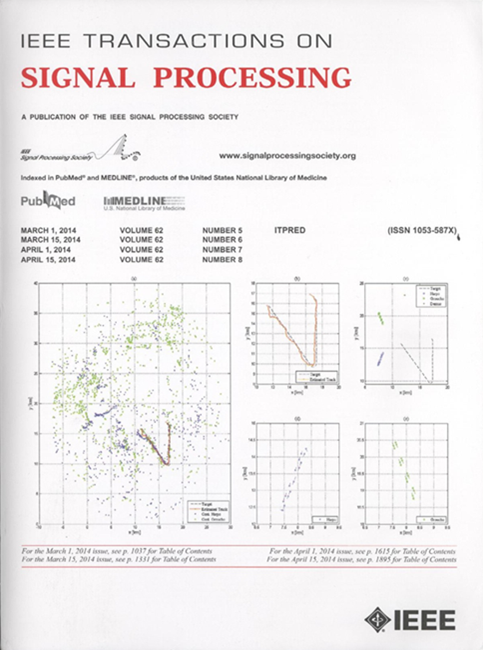算术平均密度融合-第四部分:通过变分逼近的RFS和LRFS滤波器的分布异质融合
IF 4.6
2区 工程技术
Q1 ENGINEERING, ELECTRICAL & ELECTRONIC
引用次数: 0
摘要
本文是关于算法平均(AA)密度融合方法及其在目标跟踪中的应用的系列论文的第四部分。在本文中,我们解决了分布式异构多传感器多目标跟踪的复杂挑战,其中每个相互连接的传感器运行概率假设密度(PHD)滤波器,多重伯努利(MB)滤波器或标记MB (LMB)滤波器,并通过信息融合相互协作。我们最近的工作已经证明,现有的这些滤波器的线性融合都是建立在平均它们各自的未标记/标记的博士。基于这一发现,提出了两种PHD-AA融合方法,即基于高斯混合实现的基于基数一致性的局部和多滤波器平均博士之间的kullbackleibler散度的变分最小化上界,从而实现异构滤波器的合作。一种方法只关注拟合局部高斯分量(l - gc)的权重,而另一种方法同时拟合每个传感器上l - gc的所有参数,两者都寻求未标记PHD的平均一致性,而不考虑局部滤波器的特定后验形式。对于分布式点对点通信,本文研究了经典共识模式和泛洪模式。仿真结果表明,所提方法在同构和异构场景下的有效性和灵活性。本文章由计算机程序翻译,如有差异,请以英文原文为准。
Arithmetic Average Density Fusion—Part IV: Distributed Heterogeneous Fusion of RFS and LRFS Filters via Variational Approximation
This paper is the fourth part of a series of papers on the arithmetic average (AA) density fusion approach and its application for target tracking. In this paper, we address the intricate challenge of distributed heterogeneous multisensor multitarget tracking, where each inter-connected sensor operates a probability hypothesis density (PHD) filter, a multiple Bernoulli (MB) filter or a labeled MB (LMB) filter and they cooperate with each other via information fusion. Our recent work has proven that the existing linear fusion of these filters is all exactly built on averaging their respective unlabeled/labeled PHDs. Based on this finding, two PHD-AA fusion approaches are proposed via variational minimization of the upper bound of the Kullback-Leibler divergence between the local and multi-filter averaged PHDs subject to cardinality consensus based on the Gaussian mixture implementation, enabling heterogeneous filter cooperation. One focuses solely on fitting the weights of the local Gaussian components (L-GCs), while the other simultaneously fits all the parameters of the L-GCs at each sensor, both seeking average consensus on the unlabeled PHD, irrespective of the specific posterior form of the local filters. For the distributed peer-to-peer communication, both the classic consensus and flooding paradigms have been investigated. Simulations have demonstrated the effectiveness and flexibility of the proposed approaches in both homogeneous and heterogeneous scenarios.
求助全文
通过发布文献求助,成功后即可免费获取论文全文。
去求助
来源期刊

IEEE Transactions on Signal Processing
工程技术-工程:电子与电气
CiteScore
11.20
自引率
9.30%
发文量
310
审稿时长
3.0 months
期刊介绍:
The IEEE Transactions on Signal Processing covers novel theory, algorithms, performance analyses and applications of techniques for the processing, understanding, learning, retrieval, mining, and extraction of information from signals. The term “signal” includes, among others, audio, video, speech, image, communication, geophysical, sonar, radar, medical and musical signals. Examples of topics of interest include, but are not limited to, information processing and the theory and application of filtering, coding, transmitting, estimating, detecting, analyzing, recognizing, synthesizing, recording, and reproducing signals.
 求助内容:
求助内容: 应助结果提醒方式:
应助结果提醒方式:


